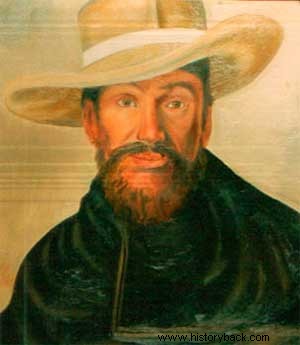Jose Faustino Sánchez Carrion , ideologue of independence. Son of Agustín Sánchez Carrión and Teresa Rodríguez. He was born in Huamachuco, into a mining family, on February 19, 1787. He began his studies at the Trujillo seminary (1802) and then moved to Lima to continue them at the San Carlos Convictory (1804), directed in that time by the Chachapoyan priest Toribio Rodríguez de Mendoza. Abandoning a possible religious vocation, in Lima he decided to study law, soaking up, like many of his classmates in the convictory, the liberal ideas imparted by Rodríguez de Mendoza.
Liberalist thought
The liberalism of the young Sánchez Carrión became known to all, including the Viceroy Fernando de Abascal himself, which is why the ruler prohibited him from being entrusted with speeches or conferences, since his word was a constant invitation to freedom. Despite these prohibitions, he made his way in the studies and came, while still a student, to teach Philosophy in the convictory (1818). That same year he obtained his law degree and entered the Lima Bar Association, an institution that commissioned him to defend people without economic resources as “lawyer of the poor” (1819). His strong inclination to liberal ideas earned him exile from Lima, ordered by Viceroy Joaquín de la Pezuela, retiring to Sayán, a small town near Huacho, where he rested from work fatigue and tried to restore his broken health . There he was when the Liberator José de San Martín proclaimed Peruvian independence (July 1821), established the Protectorate and founded the Patriotic Society in order to discuss, doctrinally, the system of government that independent Peru should have.
Sayan's solitaire
Aware of the monarchical plans of San Martín and his collaborators, he wrote a series of letters that he signed with the pseudonym “El Solitario de Sayán” . In one of them he states: "A throne in Peru would perhaps be more despotic than in Asia, and once peace is established, the leaders will dispute the palm of tyranny" . From Bernardo de Monteagudo, the monarchist minister of San Martín, a deep and prolonged hatred separated him until his death.
Sánchez Carrión positions in the government

Defender of the republican system of government, he was part -as a deputy for Trujillo- of the first Peruvian congress and was one of the inspirers of the first Constitution of Peru, of a liberal nature (1823). He collaborated in newspapers such as Correo Mercantil, Abeja Republicana and El Tribuno de la República Peruana. In June 1823 he traveled with the poet José Joaquín Olmedo to Guayaquil to invite Simón Bolívar to come to Peru and consolidate the process of independence . Bolívar entrusted him in April 1824 with the general secretary of business of the Peruvian Republic and, as such, was his companion in the triumphal march of the Liberator towards Lima. In a letter to Sucre, Bolívar wrote the following about Sánchez Carrión:“Mr. Carrión has talent, probity and limitless patriotism” . For these reasons he gained the confidence of Bolívar, who left him on the governing council, along with Hipólito Unanue and José de la Mar, and as foreign minister in 1825 when he withdrew from Peru. Sánchez Carrión also signed the invitations to the American countries to hold an amphictyonic congress in Panama.
Death of Sánchez Carrión
Exhausted by the work carried out in the difficult years of the independence wars and his health weakened, he decided to retire to the "Grande" hacienda, owned by the congregation of the fathers of the oratory of San Felipe Neri, where he died on June 2, 1825. at thirty-eight years of age.
